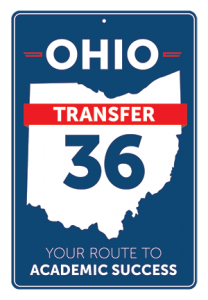Ohio Transfer to Degree Guarantee


Ohio Transfer 36
Ohio’s transfer promise helps students make timely progress toward a degree by ensuring the quality of general education coursework and ease of transfer. Ohio Transfer 36 establishes a set or subset of 36 credit hours of coursework from the general education core, guaranteed to transfer between Ohio’s public colleges and universities.
-
North Central State College’s transfer module consists English composition, mathematics, arts and humanities, social & behavioral sciences, and natural & physical sciences, totaling 38 credit hours. Once you complete the NCSC Transfer Module in its entirety with a “D” or better in each course, the entire module is guaranteed transferable to any state-supported college or university in Ohio in place of that institution’s module.
More information on approved courses for the OT36 is available from Transfer Credit Ohio here.
-
NCSC Transfer Module:
English/Oral Communication (Choose two):- ENGL 1010 English Composition I
- ENGL 1030 English Composition II
- COMM 1010 Speech
Mathematics, Statistics and Formal Logic (Choose two):
- MATH 1110 College Algebra
- MATH 1130 Trigonometry
- MATH 1150 Calculus I
- MATH 1151 Calculus II
- MATH 2030 Differential Equation
- STAT 1010 Probability and Statistics
*Arts/ Humanities (Choose two):
- ENGL 2050 American Literature I
- ENGL 2070 American Literature II
- ENGL 2090 Introduction to Fiction
- HIST 1010 American History I
- HIST 1030 American History II
- HIST-1050 Western Civilization I
- HIST 1070 Western Civilization II
- HUMA 1010 Introduction to the Humanities
- MUSC 1010 Music Appreciation
- PHIL 1010 Western Philosophy
- PHIL 1110 Ethics
- THEA 1010 Introduction to Theatre
Social Sciences (Choose two from two different subject areas):
- ECON 1010 Introduction to Economics
- ECON 1510 Microeconomics
- POLT 1010 American National Government
- PSYC 1010 Introduction to Psychology
- PSYC 1070 Introduction to Women’s Studies
- PSYC 2010 Human Growth and Development
- PSYC 2050 Abnormal Psychology
- PSYC 2090 Social Psychology
- PSYC 2100 Personality Theory
- SOCY 1010 Introduction to Sociology
Natural Sciences (Choose three, with at least one lab course):
- BIOL-1550 Microbiology for Health Professionals
- BIOL 1710 Introduction to Anatomy and Physiology
- BIOL 2751 Human Anatomy and Physiology I
- BIOL 2752 Anatomy and Physiology II
- CHEM 1030 Chemistry
- CHEM 1210 Chemistry
- CHEM 1220 Chemistry II
- PHYS 1010 Introductory Physics
- PHYS 1110 General Physics I
- PHYS 1130 General Physics II
-
To facilitate transfer with maximum applicability of transfer credit, prospective transfer students should plan a course of study that will meet the requirements of a degree program at the receiving institution.
- Students should identify early in their collegiate studies an institution and major to which they desire to transfer.
- Students should also determine if there are any special course requirements that can be met during their time at NC State College. This enables students to plan and pursue a course of study that will articulate with the receiving institution’s major.
- Students should work with their advisor to designate their transfer course plan and communicate with the college or university to which they plan to transfer.
-
The Ohio Department of Higher Education, following the directive of the Ohio General Assembly, developed a statewide Articulation and Transfer Policy to facilitate movement of students and transfer credits from one Ohio public college or university to another. Students are guaranteed the transfer of applicable general education credits among Ohio’s public colleges and universities and equitable treatment in the application of credits to admissions and degree requirements.
The purpose of the state policy is to avoid duplication of course requirements and to enhance student mobility throughout Ohio’s higher educational system. Since private colleges and universities in Ohio may or may not be participating in the transfer policy, students interested in transferring to a private institution are encouraged to check with their advisor or the college or university of their choice regarding transfer agreements.
Ohio Guaranteed Transfer Pathways
-
For course planning with NC State, check out the Ohio Guaranteed Transfer Pathways tool here. You can search by a specific major and/or institution. If you aren’t sure what you would like to study, you can use the undecided pathways while you decide which degree you wish to pursue. This tool offers a comprehensive listing of the Ohio Guaranteed Transfer Pathways (OGTPs) offered at Ohio’s public institutions of higher education.
-
Review the Ohio Transfer Promise here.
Additional Information
Students meeting the requirements of the Transfer Module are subject to the following conditions:
- The policy encourages receiving institutions to give preferential consideration for admission to students who complete the Transfer Module with a “D” or better in each course and who have successfully completed altogether at least 60 semester credit hours. These students must have an overall grade-point average of 2.00 in Transfer Module courses to be given credit for the Transfer Module, and only courses in which a “D” or better has been earned will transfer.
- The policy encourages receiving institutions to admit, on a non-preferential consideration basis, students who complete the Transfer Module with a grade of “D” or better in each course and who have successfully completed altogether less than 60 semester credit hours. These students will be able to transfer all courses in which they received a grade of “D” or better.
Admission to a given institution does not guarantee that a transfer student will be automatically admitted to all majors, minors, or fields of concentration at that institution. However, once admitted, transfer students shall be subject to the same regulations governing applicability of catalog requirements as all other students. Furthermore, transfer students shall be accorded the same class standing and other privileges as all other students on the basis of the number of credits earned. All residency requirements must be successfully completed at the receiving institution before the granting of a degree.
